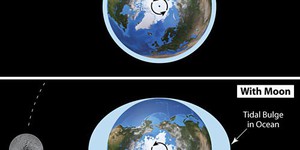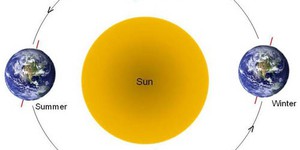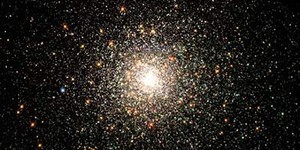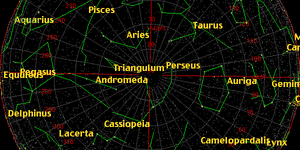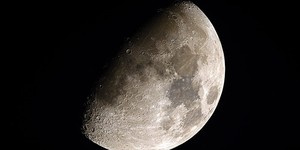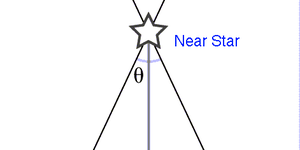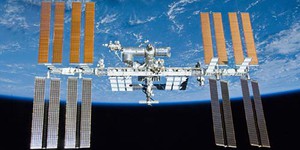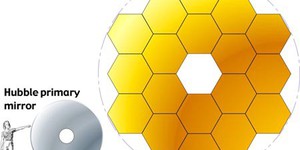Fifth Grade, Astronomy Science Projects (11 results)
Astronomy is science that will challenge your imagination. How many stars in a galaxy? How many galaxies in the known universe? How many strange worlds are out there on other planets, orbiting other stars, and what are they like? Is there life on planets besides Earth? The distances are mind-boggling; the numbers are immense.
|
Select a resource
Sort by
|
Have you ever wondered what causes the tides in Earth's oceans? In this astronomy project, you will discover the answer for yourself! You will investigate how the Sun and Moon control tides in Earth's oceans.
Read more
Featured
Have you heard that garlic powder is supposed to inhibit the growth of bacteria? Which do you think would make a better disinfectant: a solution of garlic powder or a solution of bleach? This project shows you a straightforward way to compare the effectiveness of different disinfectants (or other antimicrobial agents), by measuring zones of inhibition on a culture plate.
Read more
Do you live someplace where you get to experience the full glory of all four seasons? If so, you know well the heady blossoms and dramatic skies of spring; the long, sun-drenched days of summer; the trees shaking in crimson and gold in fall; and the sparkling, brittle snows of winter. But you might not know why we have these seasons, over and over again, in a cycle as predictable as the rising and setting of the Sun. The reasons for the seasons are surprising and have to do with Earth's tilt…
Read more
New
Remembering to take medicine at the right time can be hard, especially if you need to take multiple medications at different times of day. It might not be a big deal if you forget to take your daily multivitamin, but for some people, forgetting to take medication at the right time can be dangerous. What if you had a device that could not only set off an alarm at the right time, but also automatically dispense the right pills for you? In this project, you will build an automatic medicine…
Read more
Would it surprise you to learn that no one knows the exact age of the universe? Astronomers have estimates, and as they gather increasingly precise data and measurements, they continue to refine those estimates to come up with more accurate estimates. In this project, you can look at data about stars in dense groups called globular clusters and come up with your own estimate for the minimum age of the universe. How closely will your estimate match those of other astronomers?
Read more
You can measure the diameter of the Sun (and Moon) with a pinhole and a ruler! All you need to know is some simple geometry and the average distance between the Earth and Sun (or Moon). An easy way to make a pinhole is to cut a square hole (2-3 cm across) in the center of a piece of cardboard. Carefully tape a piece of aluminum foil flat over the hole. Use a sharp pin or needle to poke a tiny hole in the center of the foil. Use the pinhole to project an image of the Sun onto a wall or piece…
Read more
Do you like to look up into the night sky? There are so many stars, it can be mind boggling! Some ancient people marked time by the changes in star patterns. We still use changes in constellation patterns to mark astronomical time. Do constellations change more in one hour, one day, one month, or one year?
Read more
New
Drones are small, fast, and maneuverable - this can make them very hard to knock down! Check out this Mark Rober video where he explores both how professional defense companies and some backyard YouTube engineers tackle the problem of knocking drones out of the sky. Can you take this engineering challenge on yourself? What methods can you devise to take down a drone? Which one works the best?
Drones can be expensive, and you probably do not want to risk damaging a $1,000 drone for your science…
Read more
Sometimes a full moon can be so bright, you can walk around in the dark without a flashlight. How much brighter is a full moon than the other phases of the moon? How is the brightness of the moon measured?
Read more
Do you enjoy going stargazing? In a good location on a clear night, you can see a huge number of stars twinkling in the night's sky. Have you ever wondered how far those stars are from us? Ancient astronomers actually discovered a way figure this out, measuring the distance from Earth to faraway stars. How did they do it without modern technologies? In this astronomy science project you will find out by exploring the link between the distance of an object and perspective (also known as…
Read more
Comets—big lumps of rock, ice, and frozen gases that orbit the Sun—are among the most amazing
heavenly objects seen in the night sky. The glowing tail behind the comet's nucleus inspires wonder.
But did you know that a comet's tail is evidence that it's melting? As a comet passes by the Sun on
its orbital path, it starts to melt. But do bigger comets melt faster than smaller comets? In this
astronomy science project, you will investigate how the size of the comet affects the…
Read more
The movement of satellites is intriguing, but how do they orbit the way they do? Aerospace engineers run calculations and set up computer models to help them predict how satellites move in space, but in this astronomy science project, you will create a physical model with marbles, clay, and a cookie sheet to help you study how satellites move in space and learn from your observations.
Read more
Can you imagine designing and building a space telescope the size of a tennis court? Believe it or not, that is someone's job! Hundreds of engineers were involved in getting the James Webb Space Telescope (JWST) into space. This telescope has the potential to enable astronomers to see light from when the Universe was first formed. No one knows what amazing discoveries this might lead to, but already, JWST has delivered astounding deep space images that offer an unprecedented look at…
Read more
|
Explore Our Science Videos
Fire Snake Experiment
How Train Wheels Stay On Track - STEM activity
Finding Pi Using Everyday Objects

